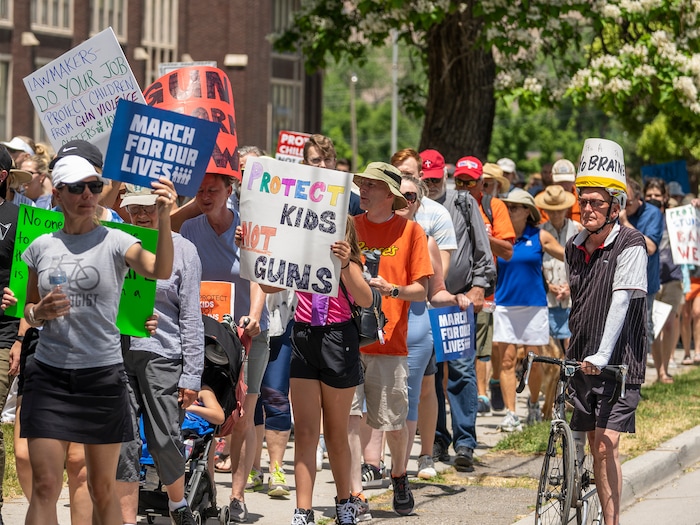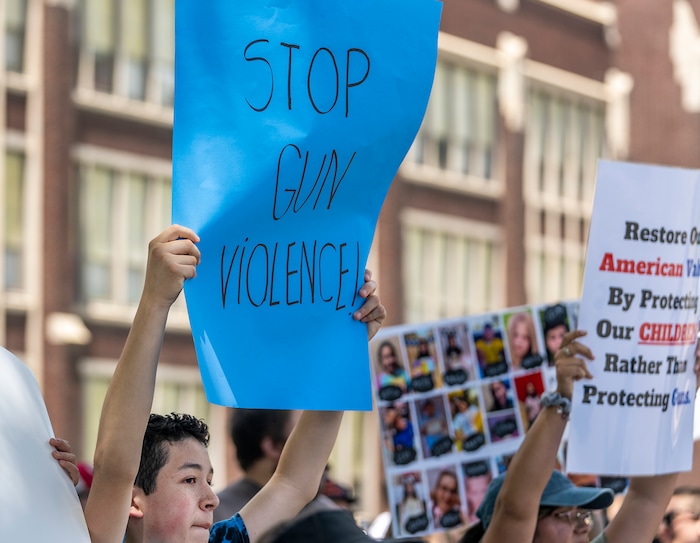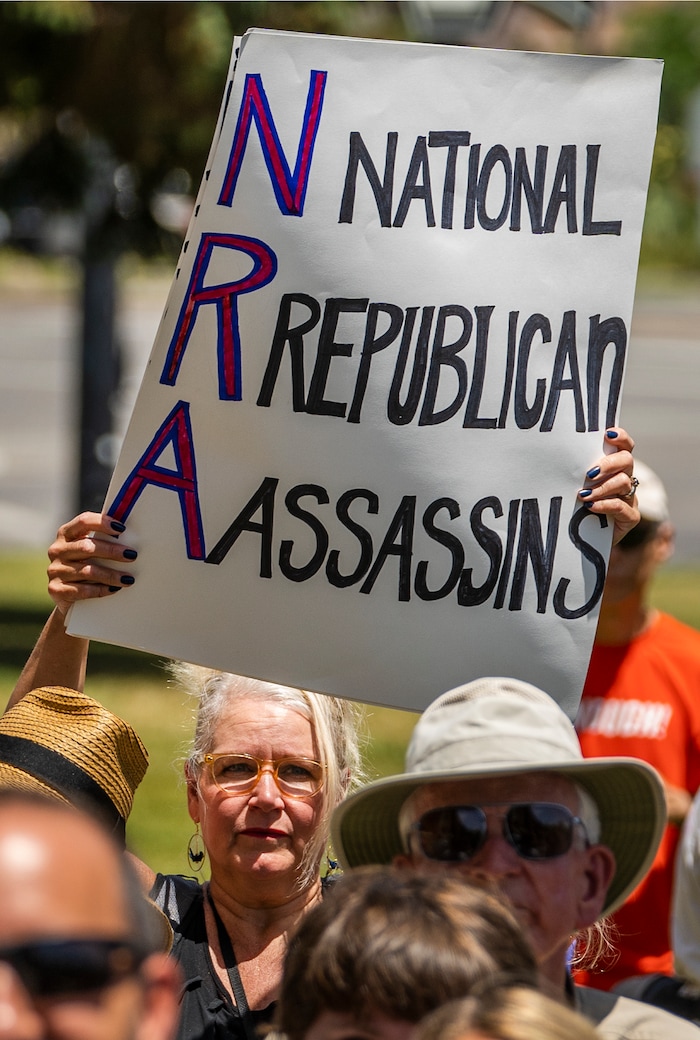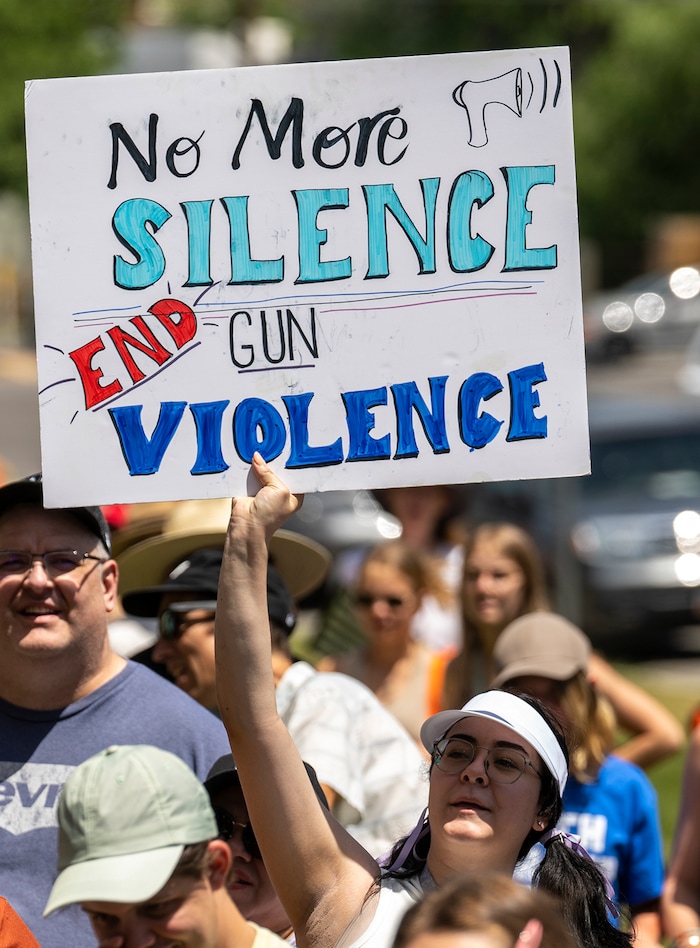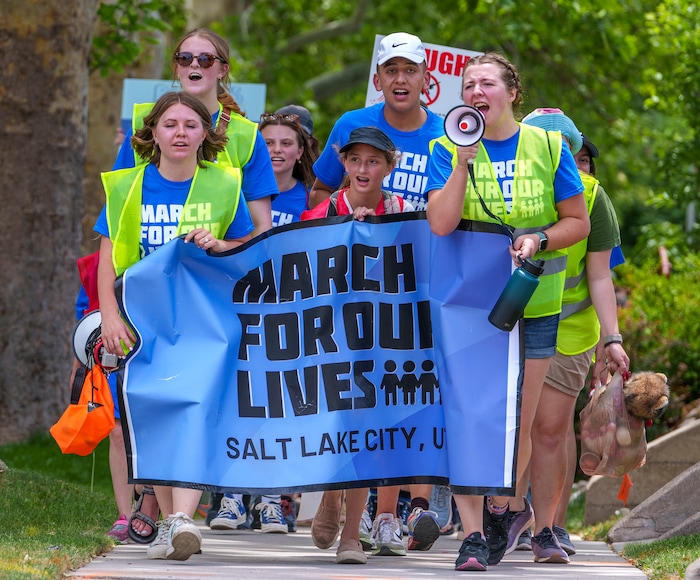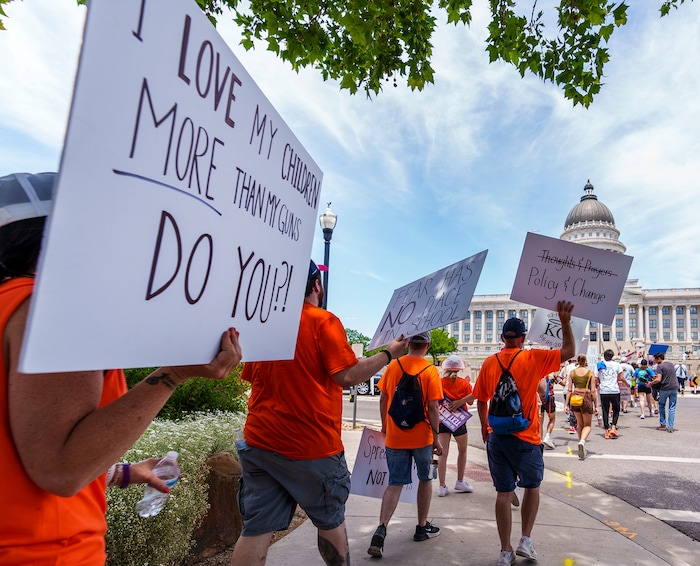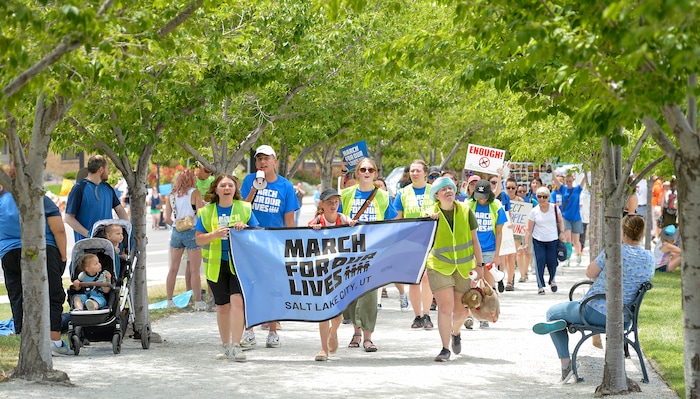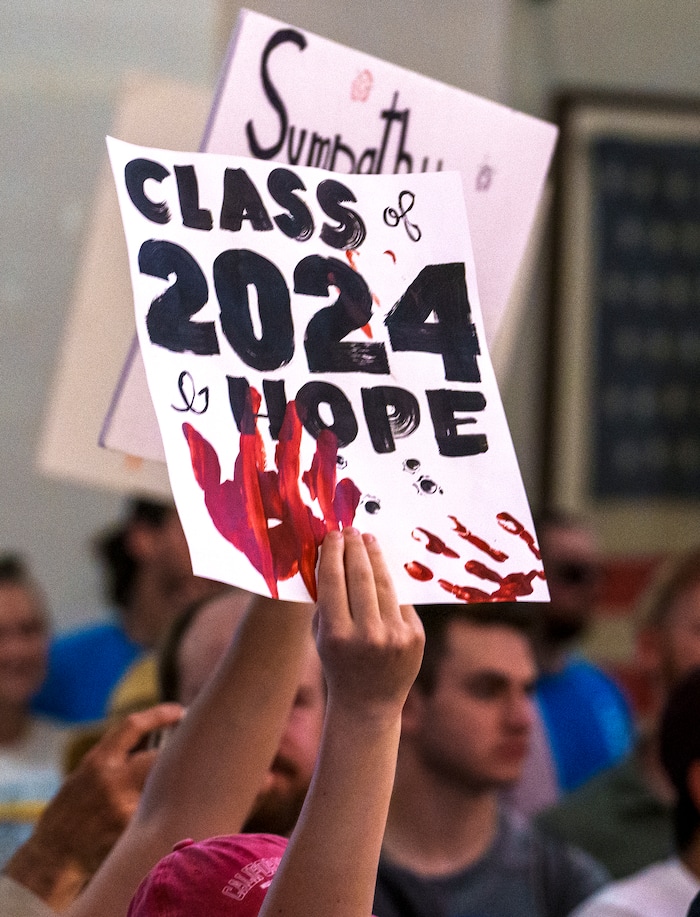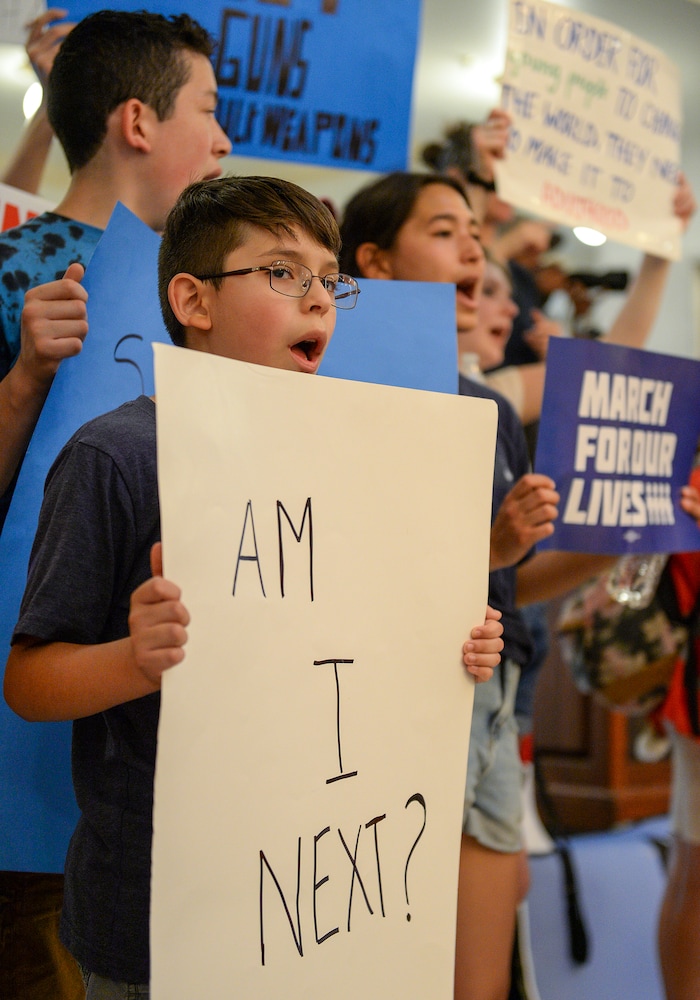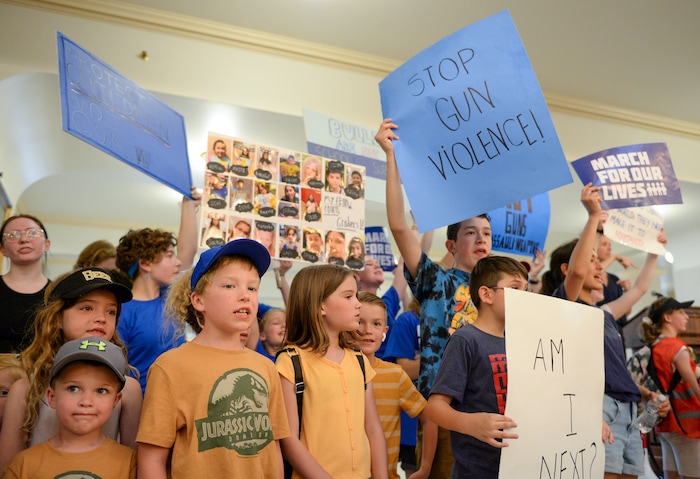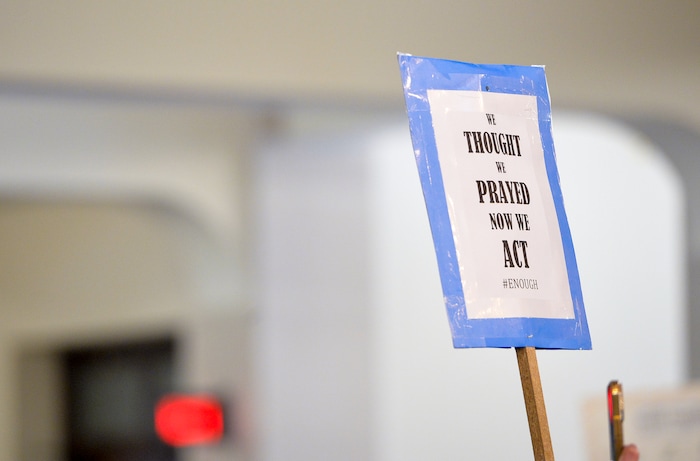Katie Glaubensklee marched Saturday in the summer heat not for herself, but for her son — and thousands of others.
Her 19-year-old son Kelly was shot to death at a high school graduation party last year in South Jordan. He was killed with silver hollow-point bullets, which are considered especially lethal.
“An 18-year-old shouldn’t be able to purchase a gun, or a handgun or the deadliest bullets, which my son was killed with,” Glaubensklee told The Salt Lake Tribune.
Glaubensklee and about 200 other Utahns gathered Saturday at a March for Our Lives rally, as part of a nationwide effort to protest gun violence, particularly in schools. Protesters held signs reading “Ban assault weapons” and “Is my classroom next?” as they marched from West High School to the state Capitol.

(Chris Samuels | The Salt Lake Tribune) Marchers hold signs and chant in support of increased gun safety measures at the Capitol in Salt Lake City, Saturday, June 11, 2022.
“The laws need to change,” Glaubensklee said, advocating for a raised age minimum to legally purchase a firearm. “We are in a different century and we have different guns. I do not think the public needs the deadliest bullets. My son might be alive today if a silver hollow-point bullet wasn’t used to kill him.”
Amid chants of “hey, hey, NRA, how many kids have you killed today?” student protesters called for Utah lawmakers to take action on gun control in the state. Daffodil Buchert, who recently graduated from East High School, criticized the state’s recent elimination of the law requiring Utahns to have a state permit to legally carry a concealed gun.
“I want lawmakers to prove that they care about their constituents’ lives,” Buchert said. “Kids, children, 10-year-olds are getting killed and lawmakers aren’t doing anything about it. I got to graduate last week, but so many kids aren’t going to ever have that opportunity.”
Many teachers were also present at Saturday’s rally, even more concerned about gun violence in the classroom in the wake of the school shooting in Uvalde, Texas.
“There were so many police officers there, they were armed and they couldn’t stop the shooter,” said Shauni Roberts, a Granite School District teacher and mother of two public school students. “People say, ‘Well why don’t we just arm teachers and that will save everything.’ That’s not the solution. The solution is keeping guns out of the hands of people who could use them at schools.”
While protesters marched just a few streets away, the Salt Lake City Police Department hosted a gun buyback Saturday afternoon for those who wanted to take their firearms out of circulation. The no-questions-asked event brought dozens of residents who received a gift card in return for their firearms.
(Leah Hogsten | The Salt Lake Tribune) Paul Mazzie, right, turns in his father-in-law's Armalite AR-18, Saturday, June 11, 2022.
Salt Lake City’s buyback was located near the side of the Public Safety Building, but another Utah firearms organization held its own buyback in front of the department.
The Utah 2A Alliance, which is dedicated to educating Utahns on gun ownership and protection, held a cash booth for those who wanted to exchange their gun but have it remain in circulation.
Guns exchanged with the 2A Alliance go back to a Federal Firearms Licensed dealer, which requires a background check to purchase the weapon. Any profits made from the event will go toward a free Utah Concealed Firearm Permit class for educators.
“These firearms that are being returned, they’re good people that are bringing these guns in,” said Clark Aposhian, chairman of the Utah Shooting Sports Council, who helped run the 2A Alliance event. “[People at the SLCPD buyback] are not the people that are the problem with that. These are law-abiding gun owners that, quite honestly, are taking interest in performative bull-crap on the mayor’s part.”
But Cottonwood Heights resident Shauna Clark felt like SLCPD’s buyback would make an impact, at least for her. And after participating at the event Saturday, she left to attend the March for Our Lives Rally.
“I have a gun that I don’t use, and I just thought ‘It is possible that somebody could get into my house and get the gun,’” Clark said. “I’ve never even fired it. I am really for gun safety, and I don’t want this gun to get into the wrong hands.”
She received the weapon when it was willed to her, and kept it for personal protection. But Clark said she didn’t think she could ever use it.
“The shootings definitely got me thinking about it,” Clark said. “It’s just part of my wanting to be part of change.”

